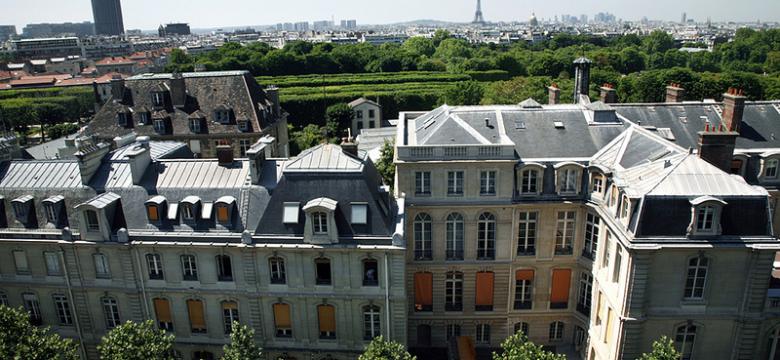The partnership between PSL and ParisTech Review, which gave rise to the Paris Innovation Review, reflects a shared vision: for developed economies, as well as for institutions with a global vocation, innovation is the very key to power. Yet one does not simply decree innovation. Innovation dynamics, on the other hand, can be enabled, by enhancing exchanges between disciplines, between institutions, between cultures, between public and private stakeholders, between researchers and entrepreneurs. An institution like PSL is an exchange enabler. Such is also the vocation of Paris Innovation Review.
Read this article in Chinese | Français
Beneath the din coming from the cracks of the world that was built in 1945, which today is disintegrating before our eyes, keen ears can perceive a background noise – one which affects both the interplay between nations and the life of enterprises. This is an ever changing world, where even the strongest positions prove to be unstable, where strength and weakness cease to be qualities to become mere passing states.
This world in motion is beset by underlying tensions and agitated by crises. No denying there is ample cause for concern. Yet it is also a source of wonder: billions of men and women are moving out of poverty; there seems to be no end to technological breakthroughs, and each one of us is now connected to the rest of the planet. Some convincing answers, however fragile at this juncture, are starting to emerge to tackle global issues.
It would be absurd to throw our arms up in the air and give in to pessimism: our age is in fact full of promises. But it has become impossible to be lulled by an old-fashioned belief in progress per se, for if its benefits are better distributed today, they also carry their share of problems and unresolved questions, from environmental damage to rising inequalities, not to mention a generalized competition, made even steeper by the digitization of the world.
The isolationist temptations that can be witnessed here and there are merely petty answers, transient disturbances in the great movement of integration that more than ever makes the world go round. Technical integration, which connects a planet innervated by networks and unified by standards. Trade integration, with the internationalization of value chains and the increase in the number of companies operating on a global scale. Integration of lifestyles and cultural benchmarks, however complex and agitated. Political integration, too, for the better – COP21 – and for the worse, with the globalization of asymmetric conflicts or secret information wars.
Despite a host of financial crises, geopolitical conflicts and migratory crises, the world is inexorably integrating itself. Financial crises, migrations and conflicts are, in fact, the most tangible sign of such integration, which is not without pain.
We live in a historic moment. An exciting time, in which all stakeholders – be they individuals, companies, institutions, governments – are on the alert.
PSL and ParisTech Review, both created in 2010, are borne of this era, which has passed two of its major characteristics onto them: a global vision, from the outset; and a particular keenness for innovation, which is at the very heart of their identity.

No wonder if our partnership made more and more sense as talks advanced, and we perceived it from our first exchanges. This meaningfulness is something we feel deserves to be reassessed under new light, for the readers of the magazine, but also for our present and future partners.
Understanding innovation
Let us go back to the idea of a generalized competition, which bears some clarification. The global competition now impacts all sectors – and all players, from the smallest startup to the oldest institutions.
In this widespread shift into higher gear, innovation appears as the new key to power. A power that is defined more and more by speed, and not only by sheer mass. The future now belongs to the fastest bird. It belongs to those who shall have taken a bolder step ahead, those who shall have taken the trouble to identify nascent markets, emerging fields. This applies to large and small companies alike, as well as to universities, which are poised to take a stand on new knowledge and to seize the opportunities offered by new technologies.
This also applies to national economies, as the work of Philippe Aghion, now a professor at Collège de France, has shown: the growth of developed countries, which has long been based on technological imitation, is now driven by innovation, and great emerging nations are in turn entering the game. Philippe Aghion draws two consequences. In an open and innovative economy, new businesses and new jobs are constantly being created, while others are destroyed. In other words, we are now living in the world of Schumpeter. A second consequence is that it is increasingly crucial for a company and, a fortiori, for a government to strive to stay on the cutting edge. Research and the development of knowledge are more strategic than ever.
At the same time, innovation cannot just be decreed. Institutions, governments and companies must nonetheless endeavor to stimulate it, to provide the best conditions for it to happen: this is the very heart of the global competition.
Driving these innovation dynamics requires far more than budgets or political will. It implies understanding them. That is, to immerse oneself in them.
A first effort consists in acknowledging a new regime of the circulation of knowledge, which does not replace the old one, but rather invigorates it.
The old model is a vertical diffusion of knowledge: top down, one would say today, or ex cathedra. In the new model, knowledge circulates, and is thereby enriched with the flow of this circulation. We are no longer merely disseminating, but rather engaged in a creative dialogue, in loop feedbacks that involve a wide variety of actors.
For this circulation to take place, a plurality of points of view, experiences and expertise must be mobilized. Academic research and experiments in the real economy must feed on each other. Within the academic world, interdisciplinary dialogue has truly become essential in the present day. The idea of a university takes its full force here.
A new definition of excellence is thus at hand here. An excellence envisaged not as a quantity (measurable in the number of Nobel Prize winners or Fortune 500 leaders coming from a given institution) but as a dynamic; not as an ex cathedra position of assured knowledge, but as an appetite for novelty, a resolute immersion in a world of flux and exchange; not as inheritance but as a future.
Ecosystems
It is in this context that the meaningfulness of the so overused term ecosystem comes into full force. For this new game is not played in abstracto: it needs actual places. Campuses, social networks, coffee machines, the Silicon Valley: such are the places! It is the very purpose of PSL which is the academic herald of an extraordinary gathering place and crossroad for ideas: Paris – and which has forged international partnerships with Cambridge, Columbia, NYU, Berkeley, EPFL, the Technion, Shanghai Jiao Tong, Tsinghua, Beida. High profile institutions that, having achieved to find a sweet spot between cooperation and competition, draw together a sphere of global innovation.

As for the Paris Innovation Review, it too is a – virtual – hub to confront ideas and to spur dialogue between diverse sources of knowledge, between diverse worlds: since its birth, it has always striven to give the floor to scientists as well as to economic decision-makers or young entrepreneurs. Such is its trademark, and the very heart of its editorial identity.
The places of innovation are really living matter. An ecosystem cannot be assembled as a machine would. One doesn’t simply decree one. But it can find resources in the richness of its environment – its biodiversity, one might say. Its sustainability and vitality depend on the diversity of its components. PSL, an emerging institution, is in itself an ecosystem of its own: it brings together many different structures, skills, approaches, which are set to remain alive and to cultivate their originality all while integrating.
Of course, the innovation ecosystem of the “city of lights” is not limited to its academic component, or to startups borne from the labs. It includes great companies, institutions and think tanks. But also a culture, a creative pool, a sociability marked by conversation and openness to the world. An institution like PSL can play a major role in nourishing this ecosystem, can spur its vitality, and enable exchanges.
The Paris Innovation Review is one of the elements, and a very much pivotal one, which allow PSL to play this role. It also facilitates exchanges with the rest of the world. Paris is par excellence remembered in history as the city of salons. A journal can be defined as a conversation, like a 21st Century salon: taking place in English, Chinese or in French, the interplay between our foreign editions makes it possible for the experts to come across each other, and for thoughts to mutually enliven each other.
High-level international forums may abound today – from Davos to academic conferences through Jackson Hole and its likes. But these are meeting places for peers. To host, in a single review, a Nobel prize in medicine, such as Françoise Barré-Sinoussi, a great Indian industrialist like Narayana Murthy and a startup founder from New York like Elliot Cohen, is another idea of globalization altogether.
*
PSL and the Paris Innovation Review proudly cultivate a global ambition. It is not only a matter of emblematizing Paris, of playing our part in the race for innovation and of reminding the world – in English, French, Chinese, and soon in Portuguese – that exciting things are happening here and now. It is a matter of bringing to life the very idea of a city that stands at the crossroads of ideas, a city open to excellence, welcoming of the diversity of opinions, and curious about what goes on elsewhere.


